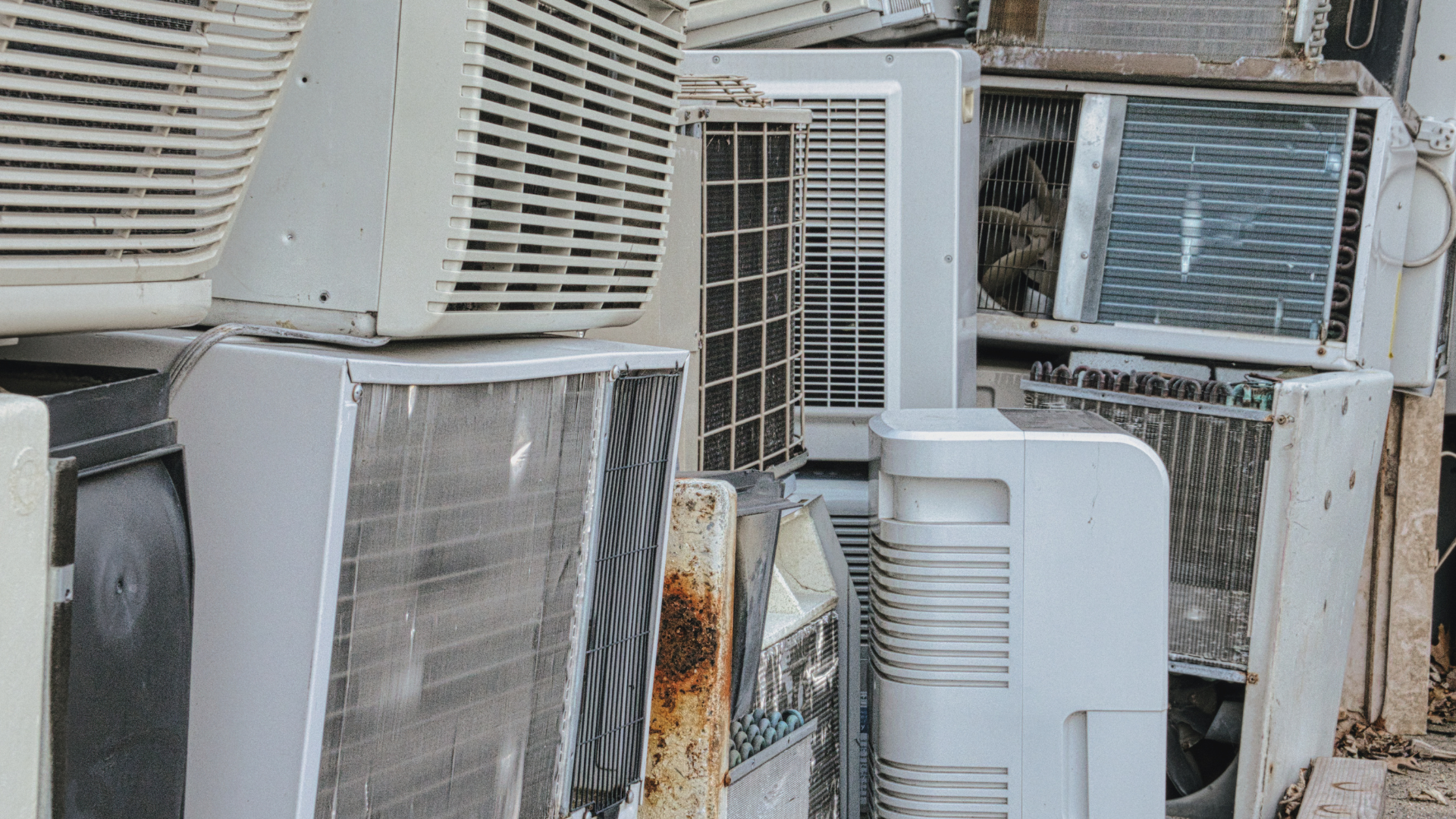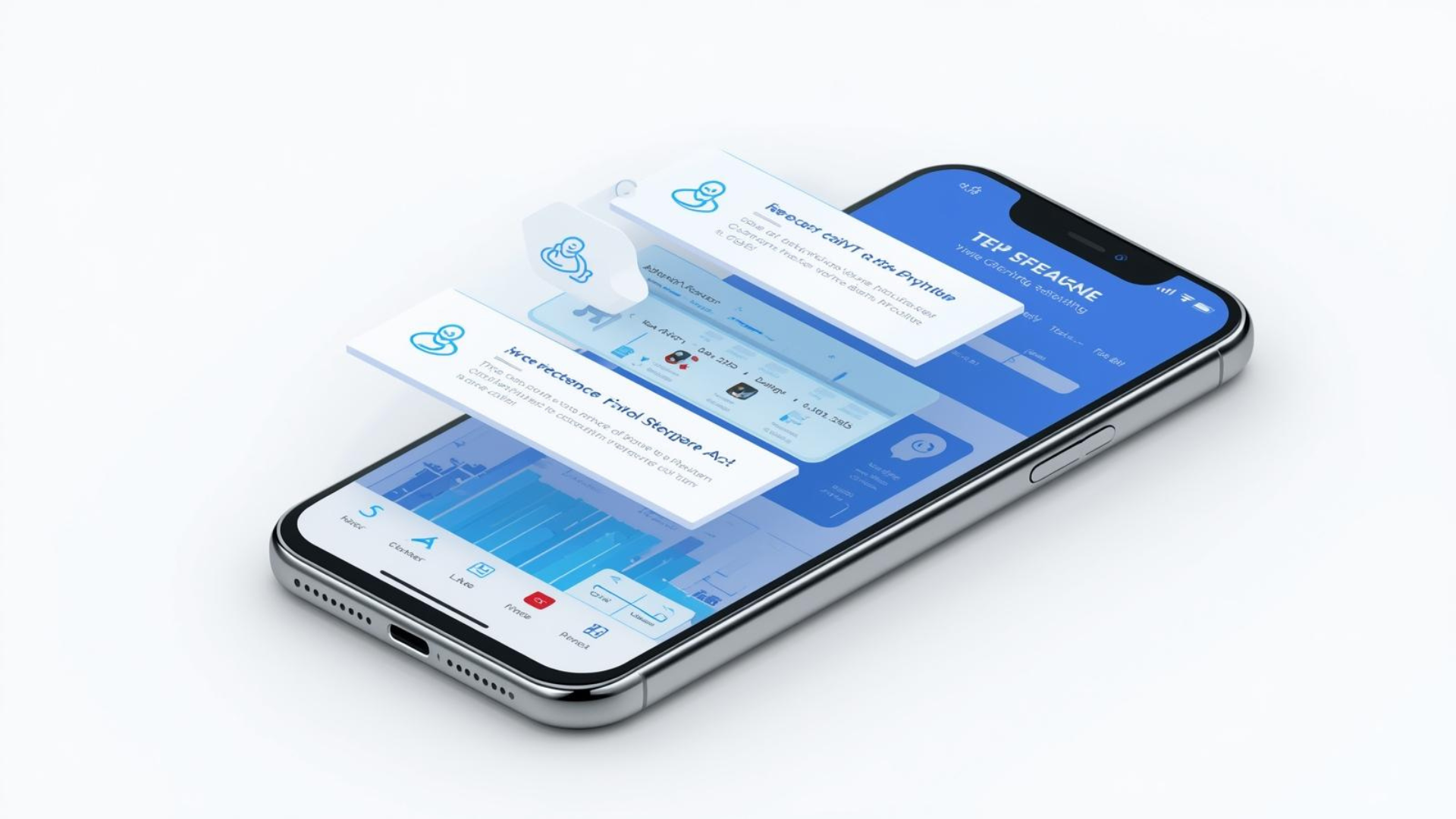The Ultimate Guide to Starting an HVAC Business
Audio overview: Listen & Learn
Starting HVAC business in 2025 is a smart move. With heating and cooling systems in constant demand, the HVAC industry continues to grow fast.
However, becoming a successful HVAC business owner requires more than just knowing how to repair an air conditioner. You’ll need a clear HVAC business plan, the right tools, proper licenses, and a solid game plan to attract and keep customers.
Therefore, this guide breaks everything down step by step, from legal setup and pricing to building a brand and getting your first client. If you're serious about starting an HVAC business this year, this is your playbook.
How to Start an HVAC Business: The Ultimate 2025 Guide
Launching a new business in HVAC means balancing technical skills with business strategy. Whether you’re an experienced technician ready to go solo or a new entrepreneur exploring the HVAC career path, this guide will help you get on the right track.
Key Takeaways
- 2025 presents a high-opportunity year to start an HVAC business, driven by rising demand and a shortage of skilled HVAC technicians.
- A solid HVAC business plan and proper licensing are foundational.
- HVAC entrepreneurs should select a legal structure that protects their assets and simplifies tax obligations.
- Smart pricing, marketing, and software tools are key to long-term profitability.
- Customer service, word of mouth, and online presence will define your success.
Why 2025 Is a Great Year to Start an HVAC Business
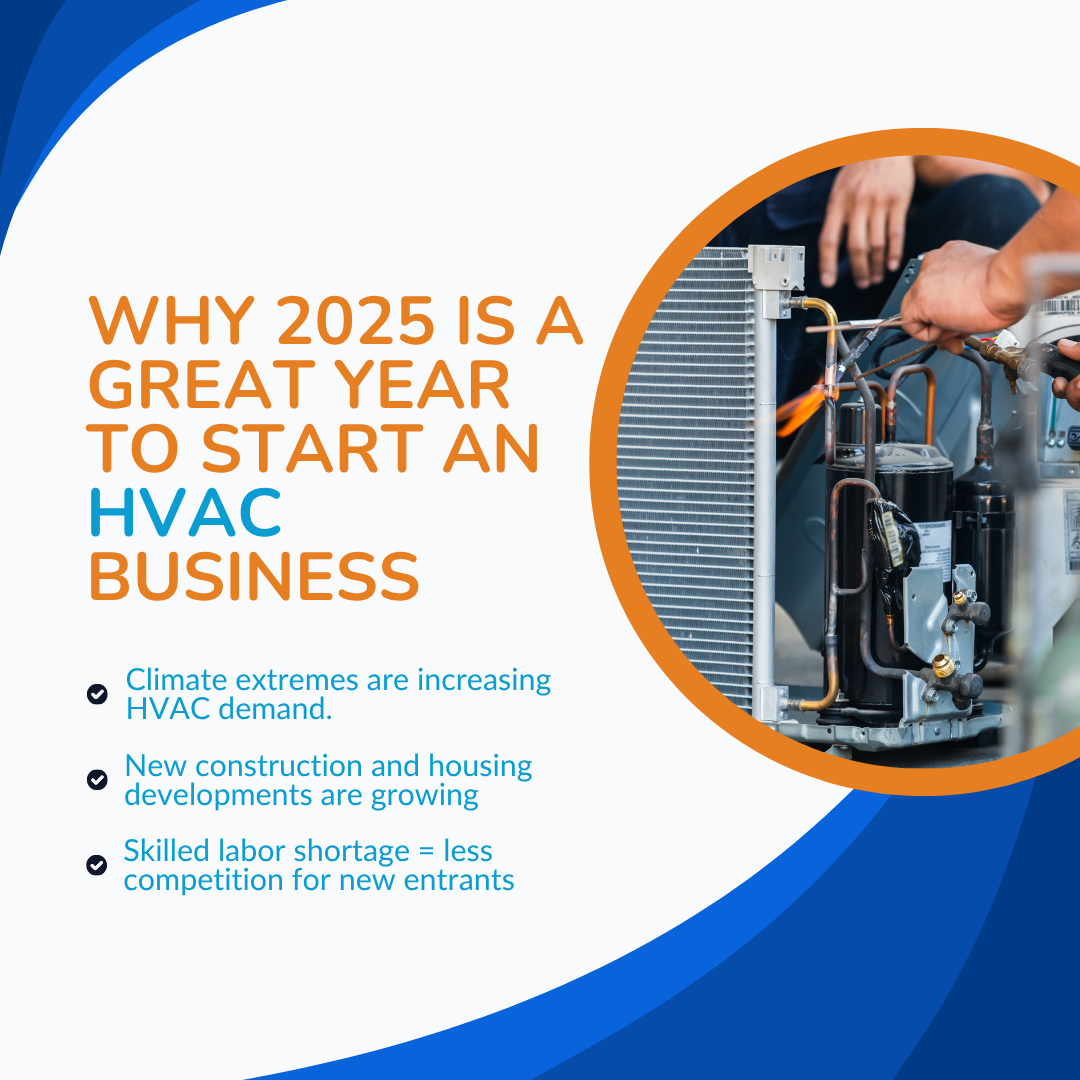
The HVAC industry is booming, and not just because everyone wants cold air in summer and heat in winter.
Here’s what’s fueling the growth:
- Climate extremes mean that heating and cooling systems are no longer a luxury; they have become an integral part of daily life for many people.
- New construction is on the rise across suburbs and small cities, with developers seeking reliable HVAC contractors.
- A skilled labor shortage means HVAC jobs are plentiful, and there’s less competition for new HVAC businesses.
If you've been thinking about starting your own HVAC business, there’s never been a better time.
Step-by-Step Guide to Starting Your Own HVAC Business
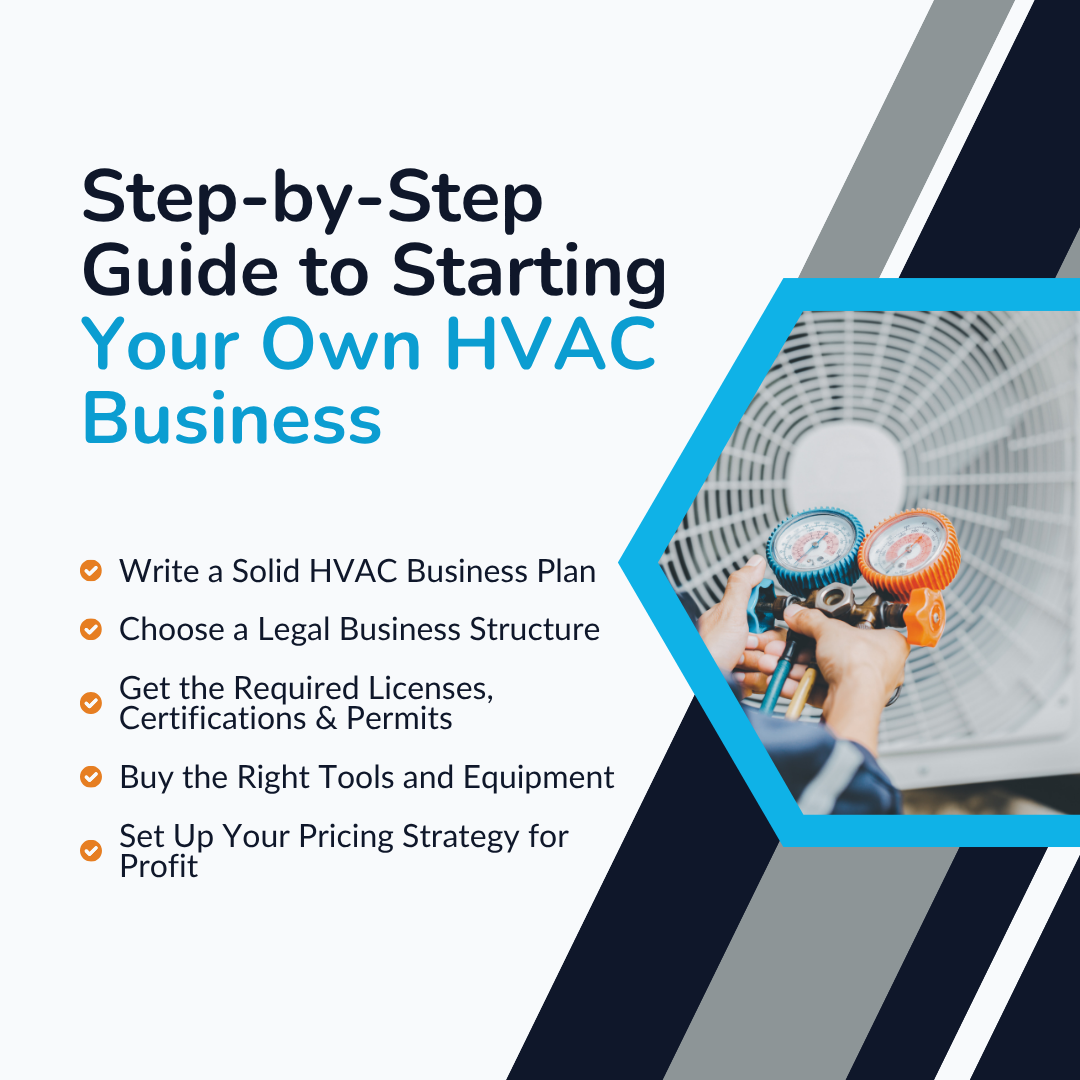
Let’s walk through the key steps to launch your HVAC company, covering everything from paperwork to tools to customer strategy.
1. Write a Solid HVAC Business Plan
Every profitable HVAC business starts with a plan. It serves as your roadmap, helping to clarify your services, startup costs, financial goals, and how you’ll stand out in your local market.
Your HVAC business plan should cover:
- Services offered: Air conditioning, heating, refrigeration, duct cleaning, maintenance packages, and commercial accounts.
- Target market: Residential customers? Property managers? Small businesses?
- Pricing Strategy: Flat Rate or Hourly? How do you stay competitive while covering costs?
- Startup costs & ROI: HVAC equipment, business insurance, tools, licensing fees, marketing, and software.
- Marketing approach: Website, word of mouth, job sites, business cards, social media.
- Business model: Will you work alone, hire employees, or subcontract?
Use templates or forecasting tools to get a clear sense of your expected income, time spent on each job, and financial obligations.
2. Choose a Legal Business Structure
Decide how you want to structure your HVAC company from day one. Your legal structure impacts taxes, liability, and your business growth.
Common options:
- Sole proprietorship: Easiest to start, but your personal assets are at risk if accidents happen.
- LLC: Popular among HVAC professionals, it protects your personal property and offers tax flexibility.
- Corporation (S or C): Better for large companies or HVAC entrepreneurs with funding plans.
Consult with an accountant or legal advisor to determine the best fit. Also, check your local government’s guidelines for forming a new business.
3. Get the Required Licenses, Certifications & Permits
To start an HVAC business legally, you’ll need:
- HVAC contractor’s license from your state or local government
- EPA Type I, II, or III certification (especially for refrigeration technician roles)
- Business license and registration
- HVAC business insurance (more on this later)
- Special permits for gas lines, ventilation, or electrical systems are required if your job sites require them.
Remember, each state has different requirements. Some may need proof of hours worked under a licensed contractor, so plan ahead.
4. Buy the Right Tools and Equipment
You can’t do quality HVAC work without the right gear.
Here’s a list of essential HVAC tools to get started:
- Gauges for low-pressure systems and refrigerants
- Recovery machines and vacuum pumps
- Multimeters and leak detectors
- Pipe cutters, crimpers, and brazing tools
- Service software or apps for scheduling, estimates, and customer records
Don’t forget a reliable van or work vehicle. Look into starter packages from HVAC supply houses or brands like Fieldpiece and Klein.
Also read: What is HVAC CRM Software and How Can It Grow Your Business?
5. Set Up Your Pricing Strategy for Profit
Your pricing needs to cover your expenses and still generate profit.
Tips for profitable pricing:
- Account for travel, tools, labor, insurance, and overhead.
- Offer flat rate pricing for standard HVAC services (e.g., maintenance tune-ups or A/C installation).
- Price your time spent wisely, especially for emergency calls or complex heating systems.
- Use software to track costs and adjust pricing as your company grows.
Build a Strong Brand and Online Presence

In 2025, your brand is more than a logo; it's your reputation, your digital presence, and how customers feel after every service call.
1. Choose a Business Name and Logo
Pick a name that reflects your HVAC services and sounds professional. Avoid names that are too narrow (like “AC Only Pros”) if you plan to expand into heating or refrigeration later.
Tips:
- Make sure the name isn’t already registered in your state
- Choose a .com domain and grab matching social handles
- Keep your logo clean and readable, even on a van or business card
2. Build a Website and Claim Local Listings
Your website doesn’t need to be fancy; it just needs to show:
- What services you offer
- Where you work
- How customers can reach you or request a quote
- Real customer reviews (even a few go a long way)
Also, claim your Google Business Profile and list your HVAC company on sites like Yelp, Angi, and Thumbtack. These listings drive traffic and improve SEO.
3. Set Up a System to Manage Leads & Jobs from Day One
Use job management software or an all-in-one HVAC CRM to:
- Track leads and customer interactions
- Schedule jobs
- Send estimates and invoices
- Store notes, documents, and equipment history
Why? Because many HVAC business owners wait until they’re overwhelmed to set this up, it becomes messy and complicated to scale.
Hiring vs. Solo: Decide How You Want to Start
You don’t have to hire a big team on day one. Many successful HVAC entrepreneurs start solo and build slowly. But it’s worth planning.
Start solo if:
- You want to keep startup costs low
- You’re confident in handling tools, sales, and admin alone
- You prefer controlling every part of the customer experience
Hire help if:
- You’re already getting too many leads to handle alone
- You want to focus on growing the business while others do the work
- You’re offering specialized services that require licensed technicians or refrigeration techs
Start with part-time or subcontracted help if full-time employees feel overwhelmed at first.
Start Getting Customers: Marketing Your HVAC Business

Once your paperwork and tools are in place, it’s time to bring in jobs. Here’s how to market your new HVAC business effectively:
1. Identify Your Ideal Customer Base
Get specific. Are you helping small businesses with maintenance? Homeowners replacing old heating systems? Landlords needing regular service?
Tailor your messaging to your target market, and you’ll book jobs faster and cheaper.
2. Go Where the Jobs Are: Smart Use of Job Sites & Ads
- List your services on local job boards and directories
- Use Facebook groups and neighborhood apps like Nextdoor
- Run small, targeted Google Ads or Facebook Ads for local zip codes
- Print and distribute flyers or magnets in high-traffic neighborhoods
Bonus: Partner with builders, realtors, or general contractors who can refer you work.
3. Retain Customers with Stellar Service
The easiest way to grow is to make your current customers your marketing team.
- Be polite, on time, and clean up
- Offer maintenance plans or service reminders
- Ask happy customers to leave a review or refer you to others
- Follow up via phone calls or email a few days after the job
Word of mouth is the secret weapon of any profitable HVAC business.
Also read: How to Improve Customer Service in HVAC with Management Software
Why Using Software Early Can Make or Break Your HVAC Business
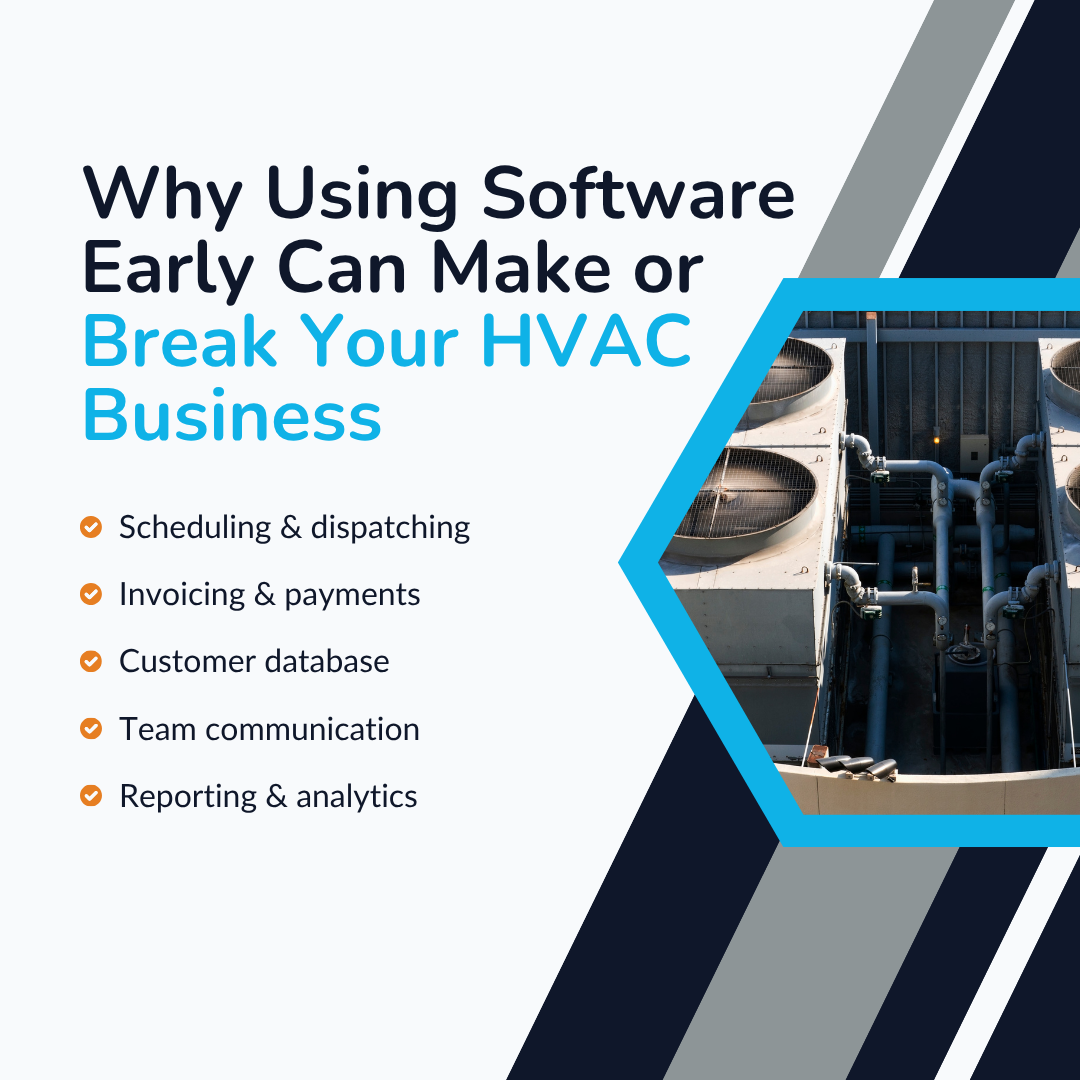
It’s tempting to do everything manually when you’re just starting. But managing paper invoices, spreadsheets, and texts will drain your energy and limit how fast you grow.
Here’s what good HVAC software helps with:
- Scheduling & dispatching: Fewer missed appointments = more jobs
- Invoicing & payments: Get paid faster and track costs accurately
- Customer database: Keep notes, unit history, and past estimates in one place
- Team communication: Assign jobs to techs, upload job photos, and avoid miscommunication
- Reporting & analytics: Track what services bring in the most profit
Investing in software early sets you up to run a streamlined, scalable operation. No matter your business model.
Check out: 5 Proven Ways HVAC Business Owners Can Maximize ROI with Software
Final Checklist Before You Start Your HVAC Business
Before you hit the ground running, go through this quick checklist:
✅ HVAC business plan written
✅ Business name registered and domain secured
✅ Licenses and permits acquired
✅ HVAC tools and safety equipment purchased
✅ HVAC business insurance in place
✅ Website, logo, and business cards ready
✅ Pricing strategy finalized
✅ Lead management system or software set up
✅ Initial marketing plan launched
✅ First few jobs or leads lined up
Summary
Starting an HVAC business in 2025 means stepping into a growing, high-demand industry where the need for reliable heating and cooling systems is only rising.
But technical skills alone won’t get you far.
To build a successful HVAC business, you need a solid HVAC business plan, the right licenses and tools, a pricing strategy that protects your profit, and a system to
manage jobs from day one.
The road to becoming a confident HVAC business owner isn’t always easy, but with the correct setup, mindset, and tools, it’s 100% doable.
About HVACBase
HVACBase is a simple and powerful platform designed for HVAC professionals who want to run a smoother business without the usual chaos. Whether you're just starting your HVAC company or looking to scale, we give you the tools to stay organized, close more jobs, and impress your customers.
Here’s what you can do with HVACBase:
- Track leads from initial inquiry to final invoice, no more digging through emails or sticky notes
- Schedule jobs and dispatch techs with just a few clicks (and no miscommunication)
- Manage customer info and conversations in one place, so nothing gets lost
- Upload photos and job details from the field, great for record-keeping and upselling
- Send quotes and invoices fast, and get paid on time
- View reports and performance metrics to understand where your business is making the most profit
- Automate routine tasks like follow-ups, reminders, and maintenance schedules
HVACBase can help you run your business like a pro without drowning in paperwork.
Ready to Launch Your HVAC Business?
Don’t wait for the “perfect time.” If you’ve been dreaming of owning your own HVAC company, this is your sign to go for it.
Book your demo today and take the first step towards turning your dream into a reality.
FAQs
Do I need to be licensed to start an HVAC business?
Yes. Most states and local governments require HVAC contractors to hold a license. You’ll likely also need EPA certification to handle refrigerants, especially if you’re doing commercial or refrigeration work.
What is the most profitable HVAC service to offer?
System replacements, maintenance contracts, and commercial accounts typically generate the most profit. Offering both heating and cooling systems, as well as optional services like duct cleaning, can increase your average job size.
Can I start an HVAC business with no employees?
Absolutely. Many HVAC entrepreneurs start as one-person operations, handling jobs, admin, and customer communication themselves before hiring. Be sure to manage your time effectively and utilize tools to stay organized.
Have questions or need personalized advice?
Talk to an Expert Today and let our construction specialists guide you to success.


